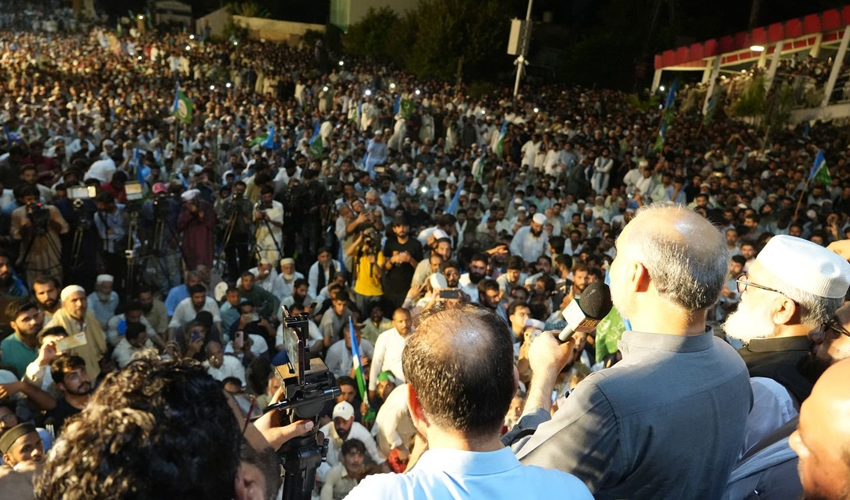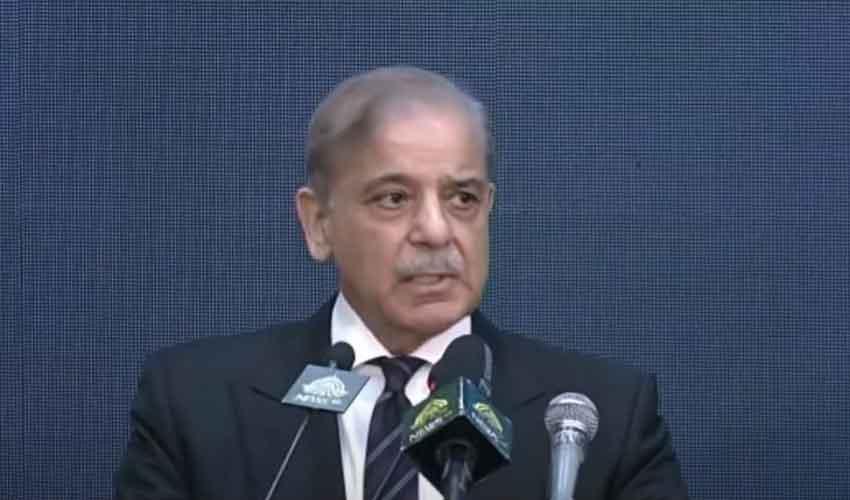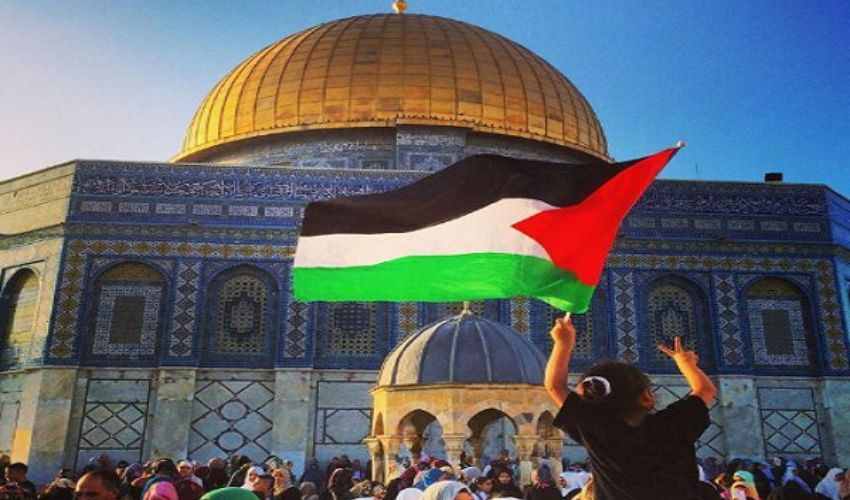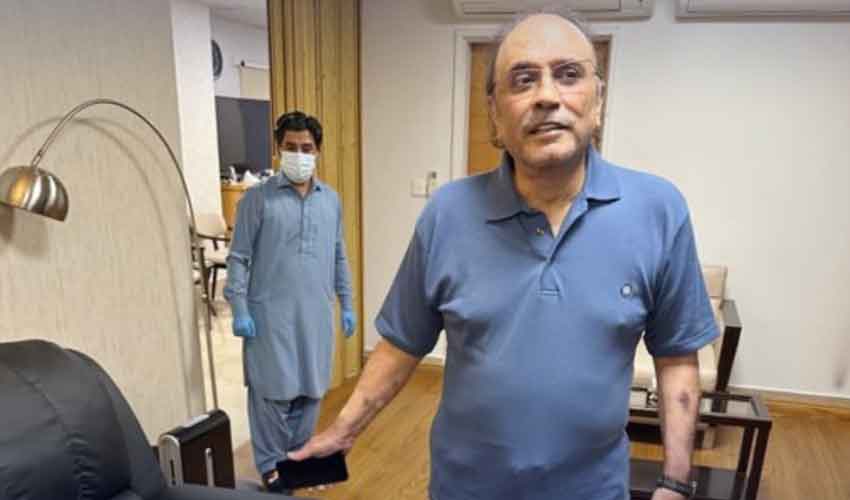Jamaat-e-Islami Ameer Hafiz Naeemur Rehman has vowed to continue the sit-in protest until the government meets their demands, saying they won't back down without securing relief for the people.
The protest, which began at Islamabad's D-Chowk, has shifted to Rawalpindi’s Murree Road due to road closures and obstacles. Thousands of supporters have gathered, demanding the formation of an empowered committee to address their grievances.
Government response
In response to the protest, Minister for Information, Broadcasting, Culture and National Heritage Attaullah Tarar on Friday announced the government’s readiness to negotiate with the Jamaat-e-Islami (JI) on their demand in a bid to end their sit-in causing inconvenience to the general public.
The government has announced a three-member team for negotiations with Jamaat-e-Islami. The committee includes Engineer Amir Maqam, Tariq Fazal Chaudhary, and Ataullah Tarar, who will work to mediate and resolve the issues raised by the protestors.
“We are ready to talk for peace, security and development of the country which is the main agenda of our government,” the minister said while addressing a news conference along with Minister for Kashmir Affairs and Gilgit Baltistan Amir Muqam.
The minister said JI Chief Hafiz Naeem ur Rehman was a seasoned and far-sighted leader whose guidance would be instrumental for the government to address the existing issues within the existing framework.
Release of arrested workers
In a related development, all Jamaat-e-Islami workers who were previously arrested in Islamabad have been released. Thirty detained workers had been transferred to Kohsar Police Station and Police Station Secretariat but are now free.
Hafiz Naeem-ur-Rehman addresses sit-in
Ameer of Jamaat-e-Islami, Hafiz Naeem-ur-Rehman, while addressing the sit-in in Rawalpindi, highlighted the increasing pressure on their workers, stating that raids and arrests have been ongoing since the previous day.
He emphasized that the situation has become unbearable, with salaried individuals and traders alike being severely affected, yet the government remains unresponsive.
Hafiz Naeem-ur-Rehman recounted a tragic incident in Gujranwala, where a dispute over an electricity bill led to one brother killing another.
He pointed out the disparity between low house rents and high electricity bills, criticizing the government's anti-people decisions. He questioned why the government continues to increase its own expenses while imposing heavy burdens on the public.
The JI chief insisted that the government must relinquish its privileges and address the demands of the sit-in, which aims to end governmental concessions.
Hafiz Naeem-ur-Rehman dismissed the government’s claim that negotiations with Independent Power Producers (IPPs) are impossible, arguing that vested interests within the government own electricity companies and exploit the IPP system. He called for the closure of several IPPs.
He demanded immediate relief, including reduced electricity bills and regulation of landlords. He proposed removing taxes from electricity bills and instead taxing landlords, as well as abolishing the tax slab for salaried individuals.
He asserted that the country's main issue is not new elections but ensuring rightful governance to those winning on Form 45. He suggested that demands for new elections by these individuals indicate deeper issues. Jamaat-e-Islami seeks to provide relief to the people and will not end the sit-in without achieving this goal. He urged the government to form an empowered committee to negotiate.
Hafiz Naeem-ur-Rehman highlighted the severe economic impact of industry closures, noting that life has become extremely difficult, with people selling household items to pay electricity bills. He reiterated that the sit-in will not end until their demands are met, including terminating several IPPs.
JI chief directs workers to reach Murree Road
Earlier, Hafiz Naeem-ur-Rehman addressed the sit-in participants, emphasizing their noble cause. He criticized the current system of oppression, stating it has burdened the people of Pakistan for 77 years, with its leaders imposing high electricity costs and exploiting Independent Power Producers (IPPs), draining billions from the country annually.
The JI chief highlighted that their protest is not for personal gain but to seek justice for the 250 million people of Pakistan. He praised the demonstrators for their rapid progress and stressed that their efforts have captured national attention.
He warned that while Jamaat-e-Islami advocates for peaceful protests, they demand the release of their detained workers. He condemned the government’s actions, which he described as oppressive, and noted that public trust in Jamaat-e-Islami is growing. He warned that the momentum of their movement is unstoppable.
Jamaat-e-Islami kicks off sit-in
Previously, Jamaat-e-Islami (JI) commenced its planned sit-in in Islamabad, with a large number of workers gathering at I-8 on the Islamabad Expressway. The sit-in, led by party leader Hafiz Naeem-ur-Rehman, began with a short address by him at 26 Number.
In his speech to the assembled crowd, Hafiz Naeem-ur-Rehman condemned the actions of the Punjab Police, who reportedly raided the homes of JI workers in an attempt to disrupt the protest.
He posed a rhetorical question to the government, asking if they believed such tactics would end the sit-in. “The sit-in has just started and will remain here,” declared Hafiz Naeem-ur-Rehman. He criticized the government for dropping “power bombs” on the public through high electricity bills and the introduction of Independent Power Producers (IPPs). He emphasized that the protest was not for personal gain but for the rights of the 250 million people of Pakistan.
The JI chief rallied the crowd, asking if they were prepared to extend the sit-in if necessary. He warned the government to release the detained JI workers, stating, “Our flood will not stop; we have peaceful people.”
The JI leader outlined the demands of the sit-in, including the closure of IPPs and a reduction in electricity tariff. He reiterated that the protest had just begun and would continue until their demands were met.
Hafiz Naeem-ur-Rehman announced the implementation of Plan B, stating that he would next move to Murree Road to demonstrate the party’s strength. He also mentioned that if the resistance continued, he would lead the protest to D Chowk.
Raids and arrests
Earlier, in a series of coordinated raids since late Wednesday night, police conducted extensive operations targeting members of the Pakistan Tehreek-e-Insaf (PTI) and Jamaat-e-Islami (JI) across various cities in Pakistan after they announced a protest sit-in at Islamabad's D-Chowk after Friday prayers.
The PTI is holding demonstrations in various cities across the country, including several spots in Lahore, outside the Islamabad Press Club, many locations in Karachi including Clifton and Haideri as well as Quetta's Metropolitan Corporation Office.
On Friday afternoon, 13 JI activists protesting at Islamabad's D-Chowk were arrested as other party workers reached Express Chowk, shouting slogans against the government. The arrested workers were transferred to Kohsar police station.
The JI spokesman claimed that so far 900 of the party workers have been arrested from across Punjab.
Meanwhile, the Lahore police arrested over 150 people, with most of the allegedly PTI workers, in an action on Sialkot motorway and Ring Road. Police claimed the arrested men were trying to go to Islamabad posing as Jamaat-e-Islami workers.
The police has placed strict blockades on the roads leading to Islamabad.
Lahore
In Lahore, police executed raids at more than 60 locations, detaining 110 individuals affiliated with PTI and Jamaat-e-Islami. Notable among the raids was the house of JI Deputy Emir Liaquat Baloch. Police detained two people, including Baloch's employee. Baloch’s son, Ahmad Salman, left to join the protest procession.
Also on Friday, the JI's procession from PP-169 of Lahore was stopped on the motorway after it left for the Islamabad sit-in. The workers were taken into custody and shifted to a police van, from where they shouted slogans.
Also Read: Why PTI and JI are protesting in Islamabad? Read demands
The houses of PTI's Hafiz Zeeshan and Yasir Gilani were raided late at night, according to police sources. Police said they conducted raids on food centres, catering service and sound system in Sandah, Gulshan-e-Ravi and arrested 11 PTI workers.
Several workers of the JI were also detained from various places, the police added.
On Thursday, raids were also conducted on the residence of PTI Lahore President Chaudhry Asghar Gujjar in the Karim Park area of Lahore. On finding him absent, the police locked his outhouse.
Gujjar said the police raided and locked the outhouse without a warrant or any legal justification. "My 30-year-old house has been locked," he added.
Rest of Punjab
In Hasanabdal, police raided the residences of Jamaat-e-Islami leaders, including Tehsil Emir Altaf Hussain and city Emir Noorul Amin. Amin’s son and three workers were arrested during these operations.
Sargodha witnessed a raid at the JI head office, with one worker detained. Police also targeted tehsil offices and the district emir's residence.
Sahiwal's raids targeted local Jamaat-e-Islami leaders’ homes, but no arrests were made as the individuals were reportedly not present. Raids were also conducted at the houses of activists across the district.
Also Read: Islamabad-Rawalpindi roads blocked with containers amid PTI, JI protest call
In Gujranwala, police surrounded the house of Jamaat-e-Islami leader Furqan Aziz Butt with a heavy contingent. Butt was not at home during the raid.
These raids come in the wake of PTI’s call for a protest on July 26. The extensive operations reflect increasing tensions between law enforcement and opposition parties, with authorities taking a firm stance against political activists in the lead-up to the planned demonstrations.
Why PTI and JI are protesting in Islamabad?
The PTI) and JI are protesting separately on Friday for various reasons, including the release of the PTI founder and record-high inflation, respectively.
To prevent the protesters, the entrance and exit routes of Islamabad were closed with containers. The Red Zone was sealed. D-Chowk, Serena Chowk, Nadra Chowk, Faizabad to Murree Expressway were also closed with containers.
The authorities have also imposed Section 144 in Islamabad.
On the other hand, Jamaat-e-Islami (JI) is protesting against electricity bills and taxes imposed in the budget 2024-25. ICT Police and law informant agencies placed containers at Red Zone Cell, D Chowk, Serena Chowk, and Expressway. Due to the closure of the roads, the citizens are facing severe problems.



























